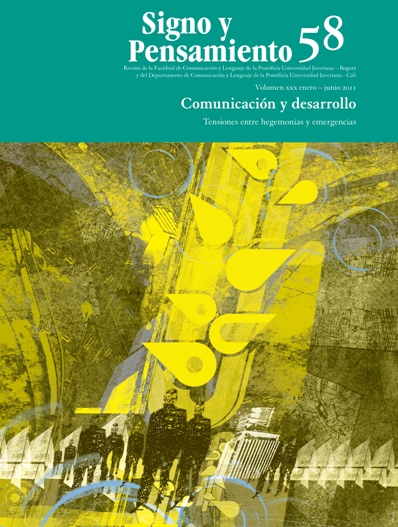Resumo
Este artículo recoge la experiencia de la curaduría digital realizada por el magíster en comunicación digital y experto en redes de información documental Omar Villota Hurtado, en el marco de los cien años del natalicio del padre Rafael García Herreros, fundador de la organización Minuto de Dios. La experiencia hace uso innovador de las tecnologías de la información y las comunicaciones, para la recopilación de la tradición oral y la construcción de la memoria colectiva, y, por medio de ésta, el reconocimiento del patrimonio cultural. En su version digital, este artículo ha sido enriquecido con hipervínculos para que el lector pueda encontrar más información sobre los autores y las experiencias mencionadas.
El lector encontrará las claves para realizar una lectura hipertextual en el portal http://clip.uniminuto.edu
Cebrián Herreros, M. (2005), “Convergencia multimedia en Internet”, en Islas C., O. (coord.), Internet y la sociedad de la información, tomo 2, Quito, Ciespal.
Davenport, T. (1997), “Information Ecology”, Oxford University Press.
Herrera Huérfano, E. (2010), “En medio de la memoria: diez años de historia de la Escuela de Medios para el Desarrollo”, Bogotá, Uniminuto.
Juliao Vargas, C. (2004), “Modelo Educativo, versión 2.3b” [en línea], Uniminuto, disponible en http://planeacion.uniminuto.edu/index. php?option=com_content&task=view&id= 96&Itemid=1&showall=1, recuperado: 31 de octubre de 2010.
Scolari, C. (2008) “Hipermediaciones. Elementos para una teoría de la comunicación interactiva”, Barcelona, Gedisa.
Siemens, G. (2010), “Conociendo el conocimiento” [en línea], Ediciones Nodos Ele, disponible en http://www.nodosele.com/editorial.
Villota Hurtado, O. (2009a) “Presentación”, Revista sobre la Curaduría Patrimonio de una Nacionalidad [en línea], núm. 1, disponible en http://clip. uniminuto.edu/index.php?option=com_cont ent&view=article&id=168:revista-sobre-estacuraduria&catid=64:curaduria-voces-patrimonio-de-una-nacionalidad&Itemid=70, recuperado: 30 de octubre de 2010.
— (2009b), “Portafolio de canal clip, proyecto de investigación” [documento de trabajo], Bogotá, Coordinación de Internet y Multimedia, Escuela de Medios para el Desarrollo, Facultad de Ciencias de la Comunicación, Uniminuto.
— (2009c), “Voces… patrimonio de una nacionalidad” [Curaduría] [inédito].
— (2010), Revista sobre la Curaduría Patrimonio de una Nacionalidad [en línea], núm. 2, disponible en http://clip.uniminuto.edu/index.php?option=com_content&view=article&id=196:revista-sobre-esteproceso&catid=64:curaduria-voces-patrimonio-de-una-nacionalidad&Itemid=70.
Esta revista científica se encuentra registrada bajo la licencia Creative Commons Reconocimiento 4.0 Internacional. Por lo tanto, esta obra se puede reproducir, distribuir y comunicar públicamente en formato digital, siempre que se reconozca el nombre de los autores y a la Pontificia Universidad Javeriana. Se permite citar, adaptar, transformar, autoarchivar, republicar y crear a partir del material, para cualquier finalidad (incluso comercial), siempre que se reconozca adecuadamente la autoría, se proporcione un enlace a la obra original y se indique si se han realizado cambios. La Pontificia Universidad Javeriana no retiene los derechos sobre las obras publicadas y los contenidos son responsabilidad exclusiva de los autores, quienes conservan sus derechos morales, intelectuales, de privacidad y publicidad.
El aval sobre la intervención de la obra (revisión, corrección de estilo, traducción, diagramación) y su posterior divulgación se otorga mediante una licencia de uso y no a través de una cesión de derechos, lo que representa que la revista y la Pontificia Universidad Javeriana se eximen de cualquier responsabilidad que se pueda derivar de una mala práctica ética por parte de los autores. En consecuencia de la protección brindada por la licencia de uso, la revista no se encuentra en la obligación de publicar retractaciones o modificar la información ya publicada, a no ser que la errata surja del proceso de gestión editorial. La publicación de contenidos en esta revista no representa regalías para los contribuyentes.


